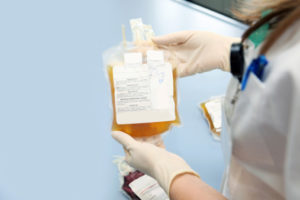In the US, the vast majority of platelets are collected via apheresis. Individuals may donate apheresis-derived platelets up to 24 times in a 12 month period. During plateletpheresis, leukoreduction is often performed to reduce transfusion reactions, but the long-term effect of lymphocyte depletion among platelet donors is unclear. Thus, researchers at one hospital-based platelet donation center performed a cross-sectional study examining immune cells in apheresis platelet donors. Donors were categorized into three groups based on the number of plateletpheresis sessions within the last 365 days: 1 or 2 sessions (N=20), 3 to 19 sessions (N=20), or 20 to 24 sessions (N=20). CD4+ T-lymphocyte counts were low in 0% (0/20), 10% (2/20), and 30% (6/20) of donors in each respective group (P=0.019). CD8+ T-lymphocyte counts were also below normal in 0% (0/20), 20% (4/20), and 55% (11/20) of donors in each group, respectively (P<0.001). Large numbers of lymphocytes (15-20%) were found in the leukoreduction system chamber, which may contribute to lymphocyte depletion in apheresis platelet donors. T-cell receptor diversity was similar across all groups, and all donors reported generally good health. The long-term consequences and duration of lymphopenia in frequent platelet donors needs further investigation.
Reference:

